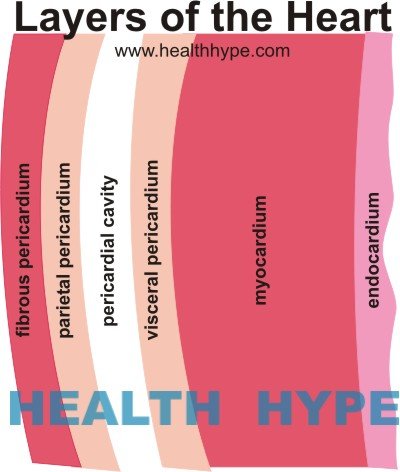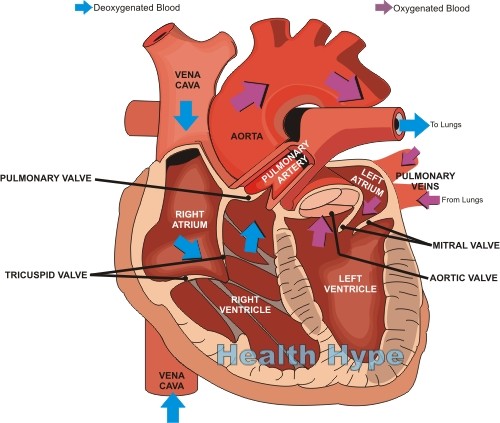Cardiac Tumors (Heart Cancer and Benign Growth)
Tumors are abnormal growths and the word elicits much fear in people. We have all heard of tumors in the skin, stomach and bowels, throat or lungs, bone and the bladder. We also know that tumors can occur anywhere in the body but what most people do not know is that tumors may even occur in the heart. Although uncommon, these tumors can have serious consequences and even prove to be fatal.
What are cardiac tumors?
A cardiac tumor is any abnormality in cell growth within the heart tissue. It can be benign (non-cancerous) or malignant (cancerous). Most cardiac tumors are benign but in the heart it is just as serious as malignant tumors (cancer). These benign tumors can seriously affect heart function even when small and with the heart being a vital organ, the smallest of benign tumors can be life threatening. With blood constantly through the heart, a benign tumor can break off and travel through the bloodstream (embolus) until it blocks a smaller blood vessel elsewhere in the body. Malignant tumors (cancers) destroy the heart as it grows and spreads. It is also more likely to break off, travel through the bloodstream and lodge elsewhere in the body where it will cause cancer.
Location of Heart Tumors
Tumors can arise in any of the three layers of the heart or the sac around the heart :
- Endocardium – inner lining of the heart wall, including the heart valves.
- Myocardium – thick muscular layer in the middle of the heart wall.
- Epicardium – thinner outer lining of the heart in contact with the pericardium (sac lining the heart).
- Pericardium – double-layered sac around the heart with the inner lining attached to the epicardium.
The different types of benign and malignant heart tumors have a predilection to originate at certain locations in the heart. Cancers can be primary or secondary. Primary heart cancers are those that originate in the heart tissue. Secondary cancers are when cancer cells spread from elsewhere, lodge in the heart and continue to grow in the heart. These secondary cancers are also known as metastatic cancers.
Types of Cardiac Tumors
Tumors can be benign of or malignant. Benign tumors are where the mass is just an overgrowth of normally shaped cells. Although benign tumors are often thought of as being harmless unless it is very large, even the smallest benign growth in the heart can be serious as it affects heart function and blood flow. The more serious tumors are the malignant tumors, commonly known as cancer. Here the cells are abnormally shaped, grow rapidly and excessively by destroying surrounding tissue and can spread elsewhere in the body. Cancer is life threatening.
Benign Heart Tumors
There are several different types of benign heart tumors including :
- Myxomas
- Papillary fibroelastomas
- Rhabdomyomas
- Fibromas
- Hemangiomas
- Teratomas
- Lipomas
- Paragangliomas
- Pericardial cysts
Myxomas
- Most common of the heart tumors.
- More frequently occurs in men.
- Can block filling of the ventricles and increases risk of embolism.
- Location : Majority develop in the left atrium.
Papillary fibroelastomas
- Affect men and women equally.
- Increases chance of embolism.
- Location : Mainly on the heart valves – aortic and mitral valves in particular.
Rhabdomyomas
- Mainly seen in infants and children.
- Affects conduction system of heart and may also lead to abnormalities in heart rate and rhythm, heart failure and may block blood flow.
- Location : Septum or free wall of left ventricle.
Fibromas
- Mainly occurs in children.
- Affect conduction system that may lead to irregular heart rhythm and even lead to sudden cardiac death.
- Location : Heart valves or walls separating the ventricles.
Hemangiomas
- Rare tumors of the heart.
- Only causes symptoms in a minority of patients.
- Can cause irregular heart beat (arrhythmias), blood accumulation around the heart and even lead to sudden death.
- Location : Mainly the right ventricle.
Teratomas
- Mainly occurs in infants and children.
- Can compress the aorta and pulmonary artery.
- Location : Base of the great vessels, mainly in the front.
Lipomas
- Can affect any age group.
- May lead to arrhythmias (irregular heart rhythm) and obstruct blood flow.
- Location : Anywhere in the heart.
Pericardial cysts
- Fluid-filled sacs in the pericardium.
- Usually a congenital anomaly in the middle mediastinum.
- Location : Mostly at the right cardiophrenic angle.
Heart Cancer (Malignant Tumors)
There are a few types of malignant heart tumors (cancers of the heart) including :
- Sarcomas
- Pericardial mesothelioma
- Primary lymphomas
Sarcomas
- Most common type of heart cancers.
- Several different types including :
– Angiosarcomas
– Fibrosarcomas
– Rhabdomyosarcomas
– Liposarcomas
– Leiomyosarcomas
– Osteosarcomas - Angiosarcomas are the most common.
- Mainly occur on the right side of the heart.
- Risk of spreading to the lung (metastasis) and other surrounding tissue.
Pericardial Mesothelioma
- Rare heart cancer.
- All age groups at risk.
- Risk of metastatic spread to spine and brain in addition to surrounding tissue.
Primary Lymphoma of the Heart
- Very rare cancer of the heart.
- Rapidly growing cancer.
- Treatment holds risk of causing significant heart damage.
- Mainly seen in people with a depressed immune system like in HIV/ AIDS.
Cardiac Tumors Causes
The cause of cardiac tumors are in most cases unknown. The same risk factor exists as for other types of cancers, such as cigarette smoking, family history and radiation exposure. Certain cardiac tumors are more likely to occur with some syndromes, like Gorlin syndrome or in Carney complex. A person with these syndromes are more likely to have a recurrence of the tumor even after successful treatment.
Cardiac Tumors Symptoms
The symptoms of cardiac tumors depends on many factors such as :
- Type of tumor
- Size
- Location
- Friability – likelihood of breaking off.
Benign tumors are more likely to cause :
- Embolus
- Obstruction of blood flow
- Heart murmurs
- Rapid heart rate
- Enlargement of the heart
- Arrhythmias
- Slowly progressing heart failure
Malignant tumors (cancers) are more likely to cause :
- Sudden heart failure
- Arrhythmias
- Tamponade – accumulation of fluid or blood around the heart which hampers its expansion.
- Heart block
Symptoms such as fever, weight loss, malaise (generalized feeling of being unwell), night sweats and lack of appetite are more likely to be seen with malignant tumors.
Diagnosis of Heart Tumors
- Echocardiography which is an ultrasound of the heart.
- Magnetic resonance imaging (MRI) where magnetic fields and radio waves to visualize the heart.
- CT (computed tomography) scan where a series of X-rays are taken from different angles to form an image.
- Gated pool scintigraphy where a radiocontrast dye is introduced into the heart and then X-ray images taken.
- Biopsy which is a collection of a tissue sample from the heart either through a catheter or open surgery.
Cardiac Tumors Treatment
Benign tumors involve surgical removal of the tumor (excision). While this is effective depending on the type of benign tumor, the outcome is usually poor in infants. Malignant tumors are more complicated to treat. It may involve :
- Chemotherapy
- Radiotherapy
Depending on the size and type of tumor, these therapies may be used to treat the cancer or provide relief from the symptoms (palliation) along with other measures. Surgery is usually not an option as cancers invade the heart tissue. The outcome for heart cancer is very poor.
References :
- http://www.merckmanuals.com/professional/cardiovascular_disorders/cardiac_tumors/cardiac_tumors.html
- http://www.cedars-sinai.edu/Patients/Health-Conditions/Cardiac-Tumors.aspx
- http://cardiacsurgery.ctsnetbooks.org/cgi/content/full/2/2003/1373?ck=nck







